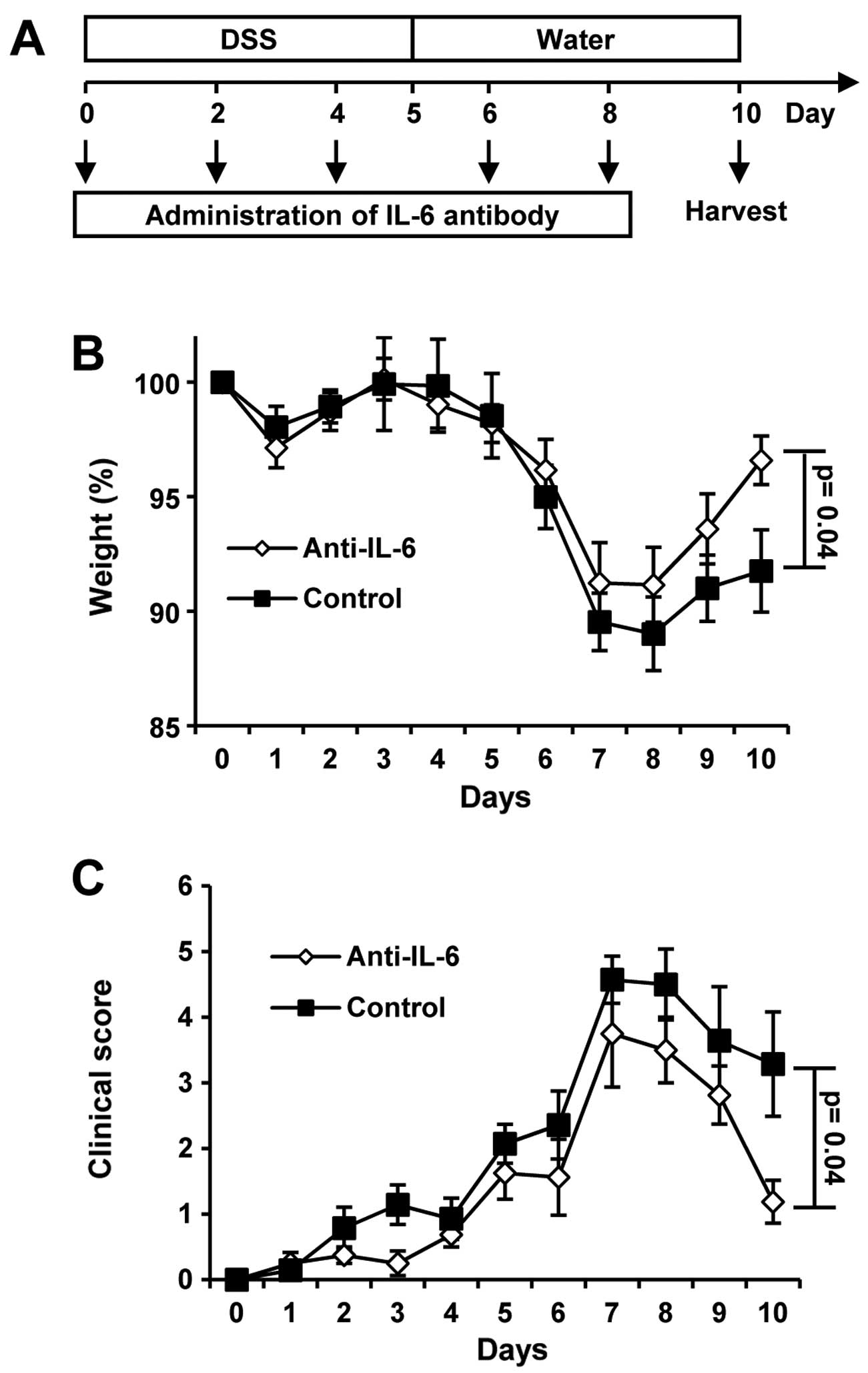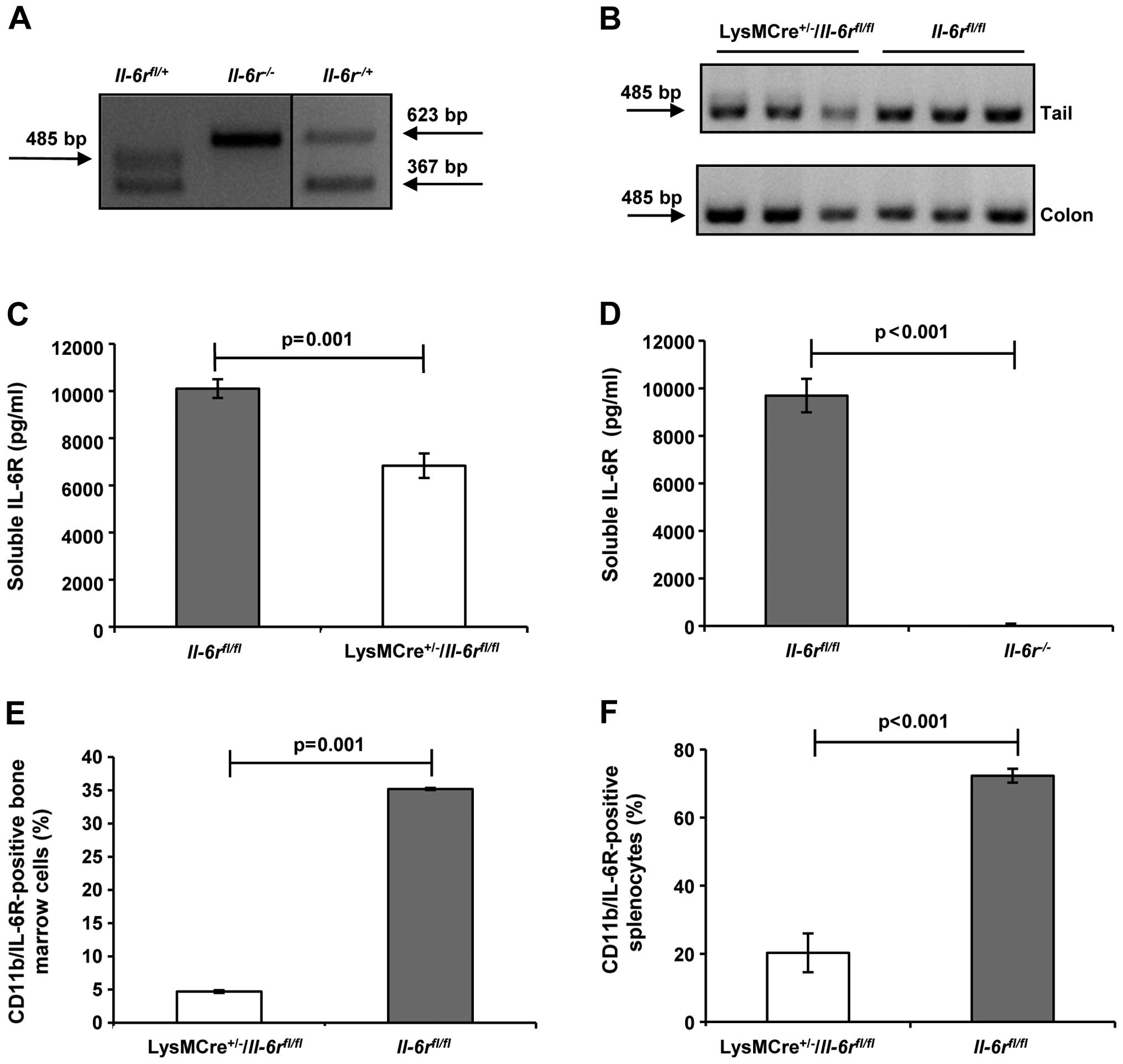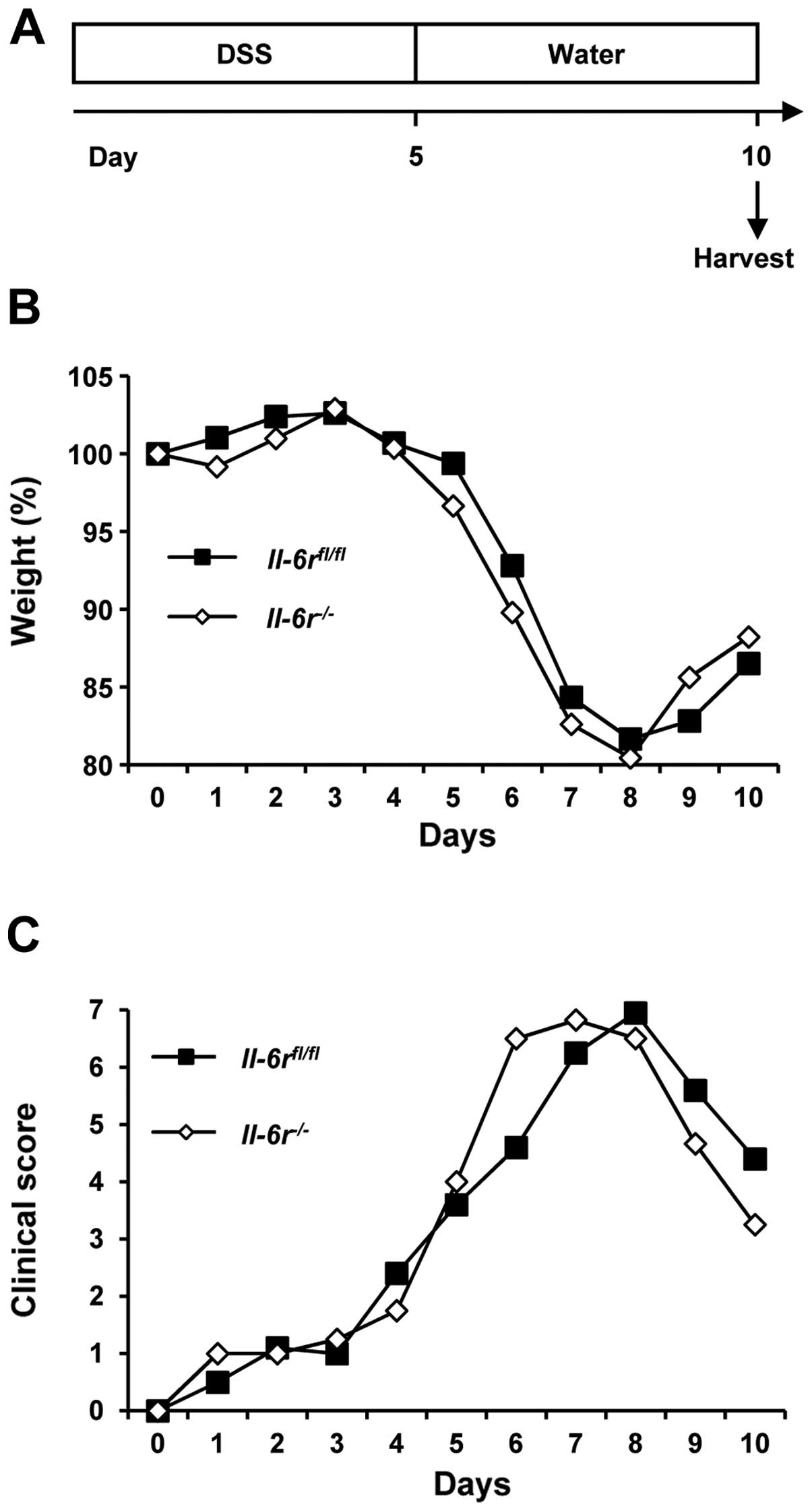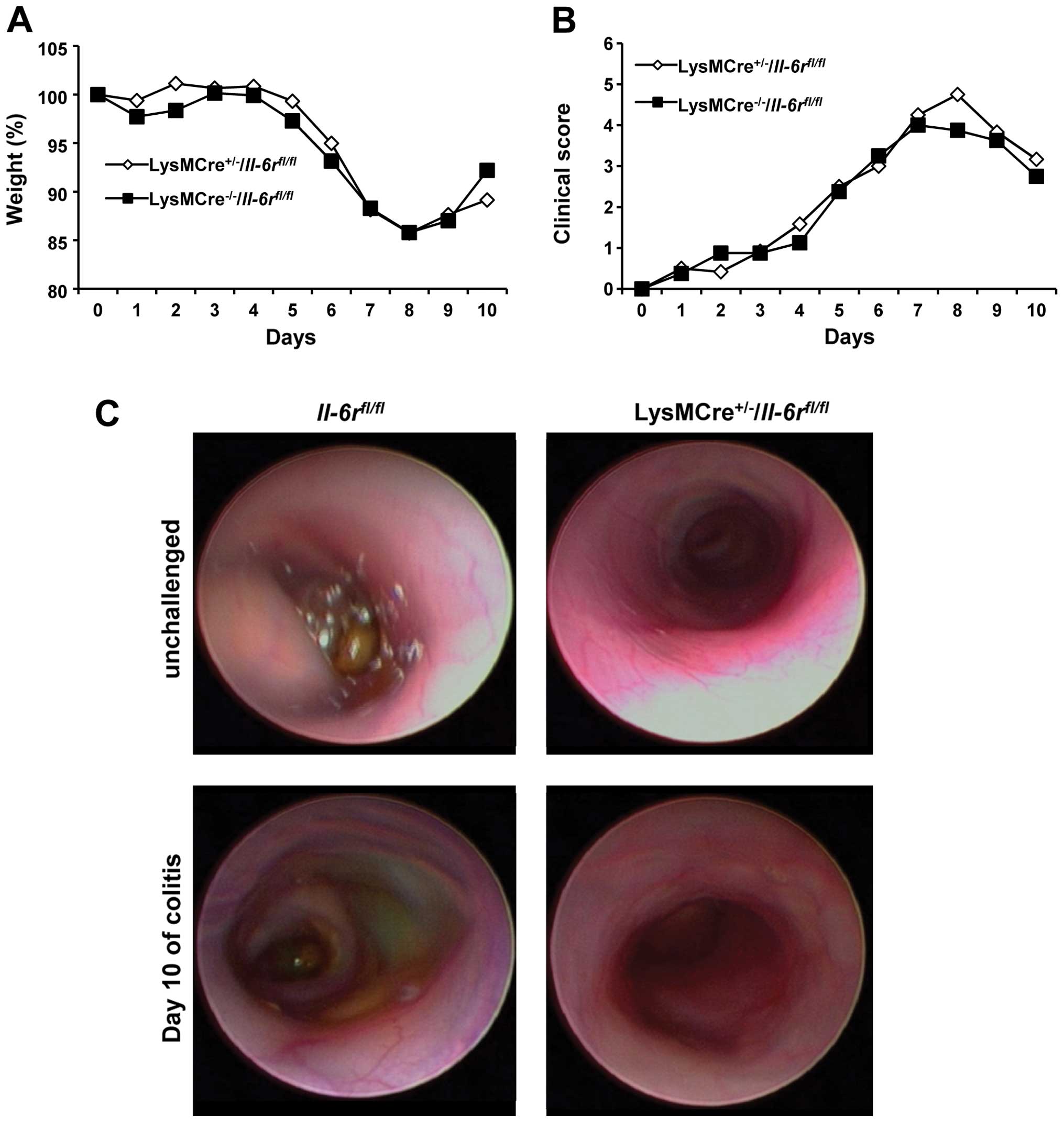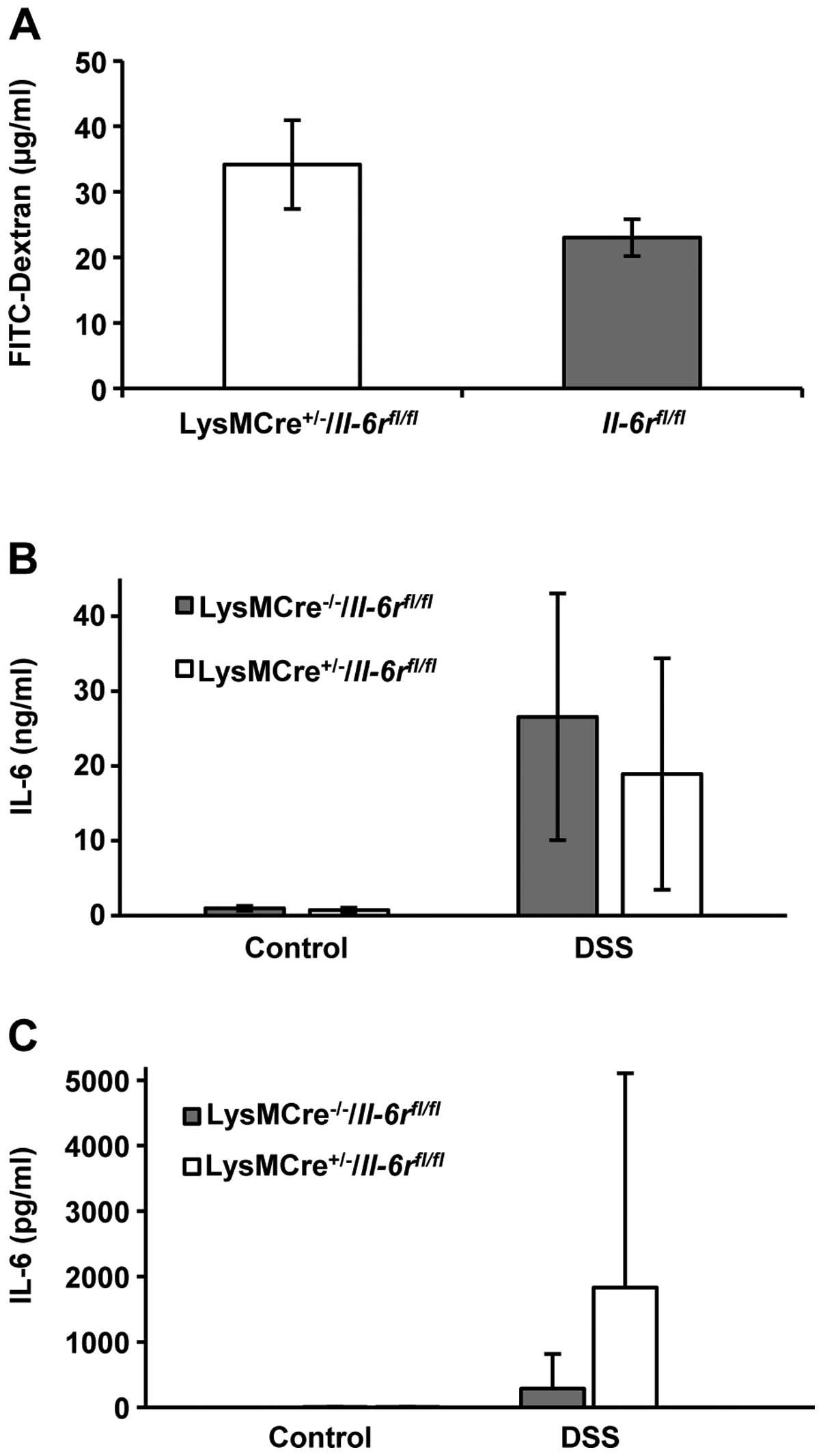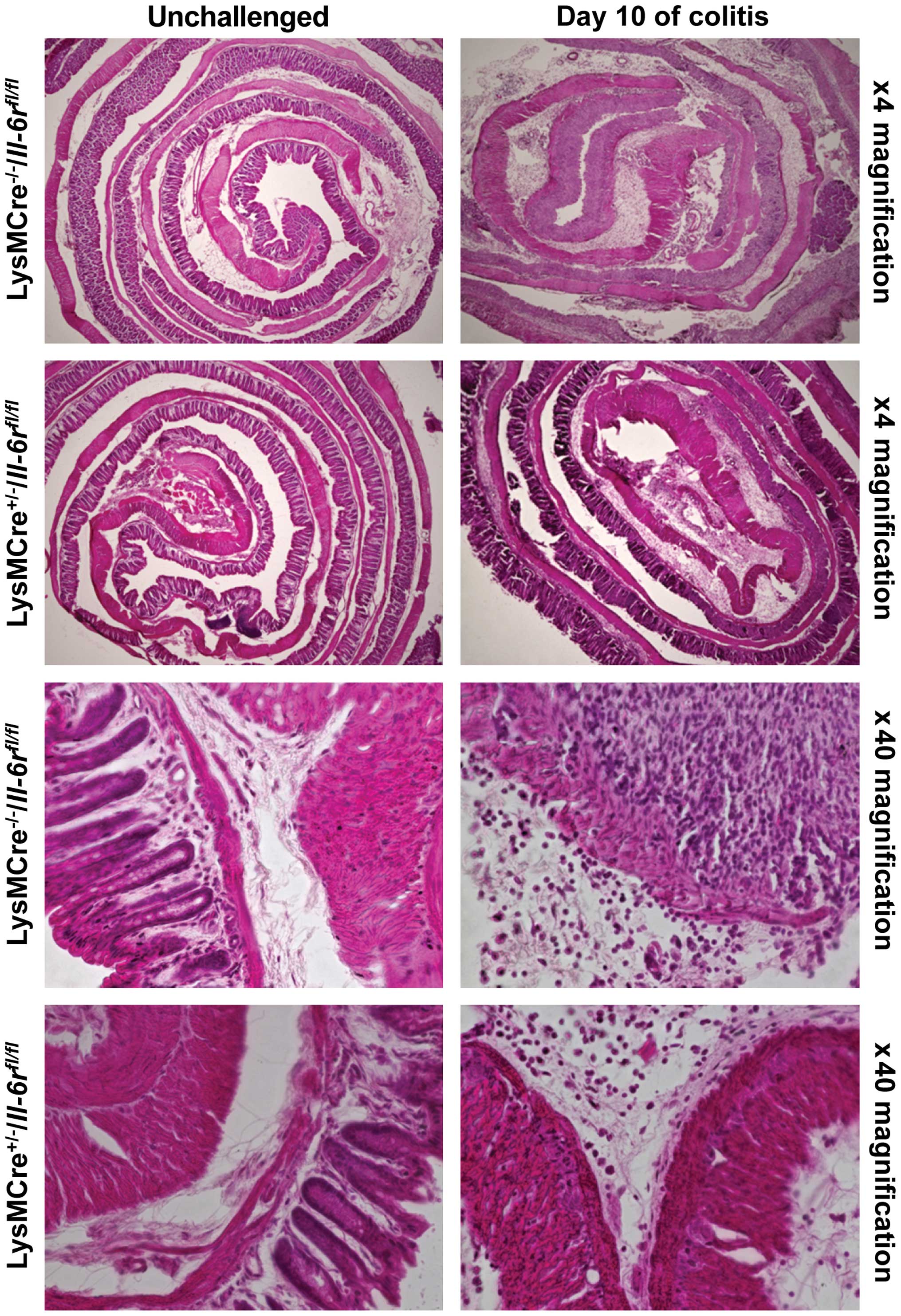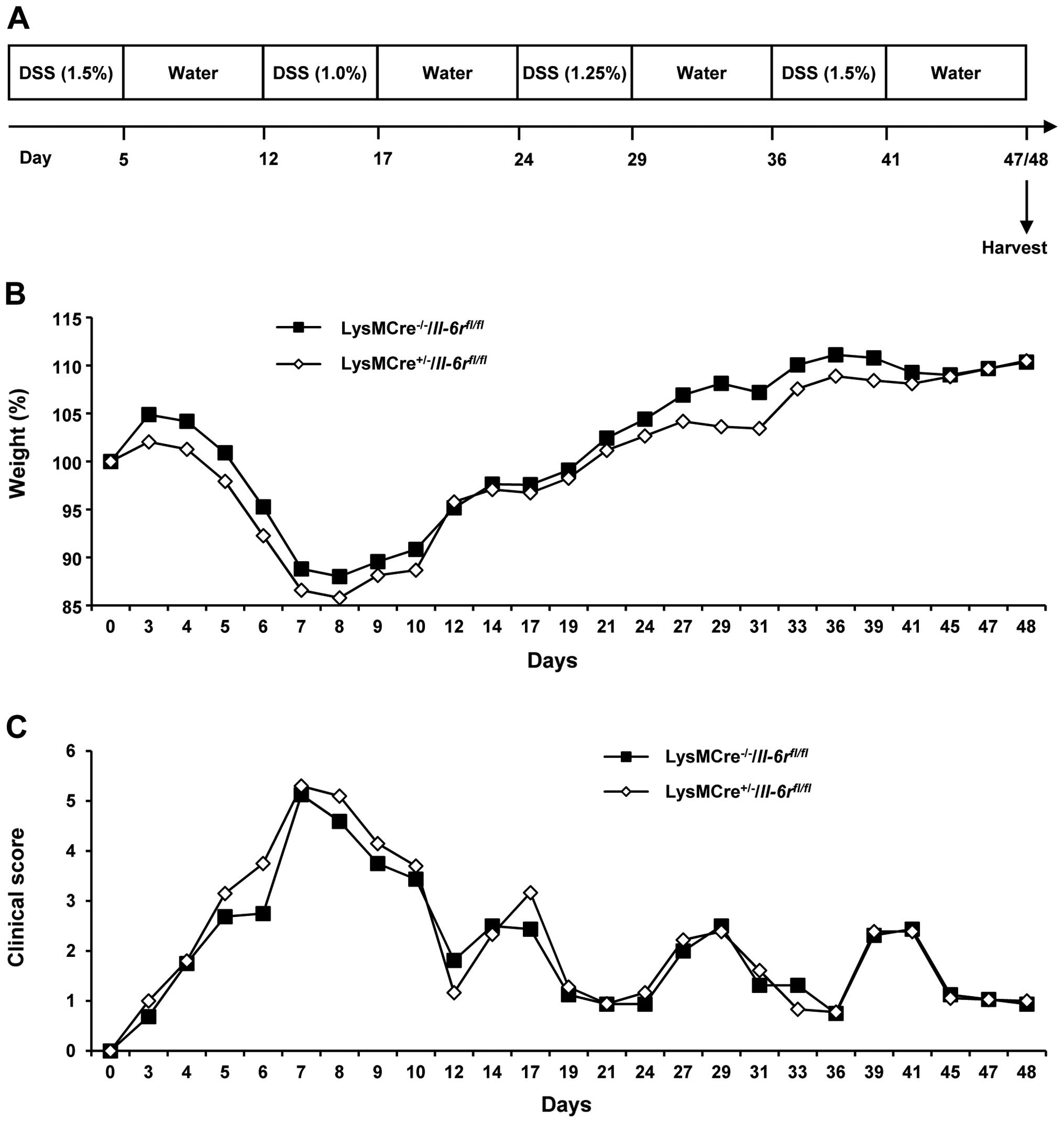|
1
|
Podolsky DK: Inflammatory bowel disease. N
Engl J Med. 347:417–429. 2002. View Article : Google Scholar
|
|
2
|
Shapira Y, Agmon-Levin N and Shoenfeld Y:
Defining and analyzing geoepidemiology and human autoimmunity. J
Autoimmun. 34:J168–J177. 2010. View Article : Google Scholar : PubMed/NCBI
|
|
3
|
Danese S, Sans M and Fiocchi C:
Inflammatory bowel disease: the role of environmental factors.
Autoimmun Rev. 3:394–400. 2004. View Article : Google Scholar : PubMed/NCBI
|
|
4
|
Mudter J and Neurath MF: Il-6 signaling in
inflammatory bowel disease: pathophysiological role and clinical
relevance. Inflamm Bowel Dis. 13:1016–1023. 2007. View Article : Google Scholar : PubMed/NCBI
|
|
5
|
Reinecker HC, Steffen M, Witthoeft T,
Pflueger I, Schreiber S, MacDermott RP and Raedler A: Enhanced
secretion of tumour necrosis factor-alpha, IL-6, and IL-1 beta by
isolated lamina propria mononuclear cells from patients with
ulcerative colitis and Crohn’s disease. Clin Exp Immunol.
94:174–181. 1993.PubMed/NCBI
|
|
6
|
Mudter J and Neurath MF: Apoptosis of T
cells and the control of inflammatory bowel disease: therapeutic
implications. Gut. 56:293–303. 2007. View Article : Google Scholar : PubMed/NCBI
|
|
7
|
Yamamoto M, Yoshizaki K, Kishimoto T and
Ito H: IL-6 is required for the development of Th1 cell-mediated
murine colitis. J Immunol. 164:4878–4882. 2000. View Article : Google Scholar : PubMed/NCBI
|
|
8
|
Ito H: Novel therapy for Crohn’s disease
targeting IL-6 signalling. Expert Opin Ther Targets. 8:287–294.
2004.
|
|
9
|
Atreya R, Mudter J, Finotto S, Müllberg J,
Jostock T, Wirtz S, Schütz M, Bartsch B, Holtmann M, Becker C,
Strand D, Czaja J, Schlaak JF, Lehr HA, Autschbach F, Schürmann G,
Nishimoto N, Yoshizaki K, Ito H, Kishimoto T, Galle PR, Rose-John S
and Neurath MF: Blockade of interleukin 6 trans signaling
suppresses T-cell resistance against apoptosis in chronic
intestinal inflammation: evidence in crohn disease and experimental
colitis in vivo. Nat Med. 6:583–588. 2000. View Article : Google Scholar
|
|
10
|
Mitsuyama K, Matsumoto S, Rose-John S,
Suzuki A, Hara T, Tomiyasu N, Handa K, Tsuruta O, Funabashi H,
Scheller J, Toyonaga A and Sata M: STAT3 activation via interleukin
6 trans-signalling contributes to ileitis in SAMP1/Yit mice. Gut.
55:1263–1269. 2006. View Article : Google Scholar : PubMed/NCBI
|
|
11
|
Grivennikov S, Karin E, Terzic J, Mucida
D, Yu GY, Vallabhapurapu S, Scheller J, Rose-John S, Cheroutre H,
Eckmann L and Karin M: IL-6 and Stat3 are required for survival of
intestinal epithelial cells and development of colitis-associated
cancer. Cancer Cell. 15:103–113. 2009. View Article : Google Scholar : PubMed/NCBI
|
|
12
|
Naito Y, Takagi T, Uchiyama K, Kuroda M,
Kokura S, Ichikawa H, Yanagisawa R, Inoue K, Takano H, Satoh M,
Yoshida N, Okanoue T and Yoshikawa T: Reduced intestinal
inflammation induced by dextran sodium sulfate in
interleukin-6-deficient mice. Int J Mol Med. 14:191–196.
2004.PubMed/NCBI
|
|
13
|
Schuster B, Kovaleva M, Sun Y, Regenhard
P, Matthews V, Grötzinger J, Rose-John S and Kallen KJ: Signaling
of human ciliary neurotrophic factor (CNTF) revisited. The
interleukin-6 receptor can serve as an α-receptor for CTNF. J Biol
Chem. 278:9528–9535. 2003.PubMed/NCBI
|
|
14
|
Garbers C, Spudy B, Aparicio-Siegmund S,
Waetzig GH, Sommer J, Holscher C, Rose-John S, Grötzinger J,
Lorenzen I and Scheller J: An interleukin-6 receptor-dependent
molecular switch mediates signal transduction of the IL-27 cytokine
subunit p28 (IL-30) via a gp130 protein receptor homodimer. J Biol
Chem. 288:4346–4354. 2013. View Article : Google Scholar
|
|
15
|
Crabé S, Guay-Giroux A, Tormo AJ, Duluc D,
Lissilaa R, Guilhot F, Mavoungou-Bigouagou U, Lefouili F, Cognet I,
Ferlin W, Elson G, Jeannin P and Gauchat JF: The IL-27 p28 subunit
binds cytokine-like factor 1 to form a cytokine regulating NK and T
cell activities requiring IL-6R for signaling. J Immunol.
183:7692–7702. 2009.PubMed/NCBI
|
|
16
|
McFarland-Mancini MM, Funk HM, Paluch AM,
Zhou M, Giridhar PV, Mercer CA, Kozma SC and Drew AF: Differences
in wound healing in mice with deficiency of IL-6 versus IL-6
receptor. J Immunol. 184:7219–7228. 2010. View Article : Google Scholar : PubMed/NCBI
|
|
17
|
Wirtz S, Neufert C, Weigmann B and Neurath
MF: Chemically induced mouse models of intestinal inflammation. Nat
Protoc. 2:541–546. 2007. View Article : Google Scholar : PubMed/NCBI
|
|
18
|
Perse M and Cerar A: Dextran sodium
sulphate colitis mouse model: traps and tricks. J Biomed
Biotechnol. 2012:7186172012. View Article : Google Scholar : PubMed/NCBI
|
|
19
|
Siegmund B, Fantuzzi G, Rieder F,
Gamboni-Robertson F, Lehr HA, Hartmann G, Dinarello CA, Endres S
and Eigler A: Neutralization of interleukin-18 reduces severity in
murine colitis and intestinal IFN-γ and TNF-α production. Am J
Physiol Regul Integr Comp Physiol. 281:R1264–R1273. 2001.PubMed/NCBI
|
|
20
|
Clausen BE, Burkhardt C, Reith W,
Renkawitz R and Forster I: Conditional gene targeting in
macrophages and granulocytes using LysMcre mice. Transgenic Res.
8:265–277. 1999. View Article : Google Scholar : PubMed/NCBI
|
|
21
|
Schwenk F, Baron U and Rajewsky K: A
cre-transgenic mouse strain for the ubiquitous deletion of
loxP-flanked gene segments including deletion in germ cells.
Nucleic Acids Res. 23:5080–5081. 1995. View Article : Google Scholar : PubMed/NCBI
|
|
22
|
Moolenbeek C and Ruitenberg EJ: The ‘Swiss
roll’: a simple technique for histological studies of the rodent
intestine. Lab Anim. 15:57–59. 1981.
|
|
23
|
Montbarbon M, Pichavant M, Langlois A,
Erdual E, Maggiotto F, Neut C, Mallevaey T, Dharancy S, Dubuquoy L,
Trottein F, Cortot A, Desreumaux P, Gosset P and Bertin B: Colonic
inflammation in mice is improved by cigarette smoke through iNKT
cells recruitment. PLoS One. 8:e622082013. View Article : Google Scholar : PubMed/NCBI
|
|
24
|
Rani R, Smulian AG, Greaves DR, Hogan SP
and Herbert DR: TGF-β limits IL-33 production and promotes the
resolution of colitis through regulation of macrophage function.
Eur J Immunol. 41:2000–2009. 2011.
|
|
25
|
Raab Y, Hallgren R and Gerdin B: Enhanced
intestinal synthesis of interleukin-6 is related to the disease
severity and activity in ulcerative colitis. Digestion. 55:44–49.
1994. View Article : Google Scholar : PubMed/NCBI
|
|
26
|
Schürmann G, Betzler M, Post S, Herfarth C
and Meuer S: Soluble interleukin-2 receptor, interleukin-6 and
interleukin-1 beta in patients with Crohn’s disease and ulcerative
colitis: preoperative levels and postoperative changes of serum
concentrations. Digestion. 51:51–59. 1992.PubMed/NCBI
|
|
27
|
Wang S, Zhou T, Zhai JP, Wang LH and Chen
J: Effects of Modified Sanhuang Decoction enema on serum tumor
necrosis factor-α and colonic mucosa interleukin-1β, interleukin-6
levels in ulcerative colitis rats. Chin J Integr Med. Oct
14–2014.(Epub ahead of print).
|
|
28
|
Lee MJ, Lee JK, Choi JW, Lee CS, Sim JH,
Cho CH, Lee KH, Cho IH, Chung MH, Kim HR and Ye SK: Interleukin-6
induces S100A9 expression in colonic epithelial cells through STAT3
activation in experimental ulcerative colitis. PLoS One.
7:e388012012. View Article : Google Scholar : PubMed/NCBI
|
|
29
|
Nesbitt JE, Fuentes NL and Fuller GM:
Ciliary neurotrophic factor regulates fibrinogen gene expression in
hepatocytes by binding to the interleukin-6 receptor. Biochem
Biophys Res Commun. 190:544–550. 1993. View Article : Google Scholar : PubMed/NCBI
|
|
30
|
Ohta K, Hara H, Hayashi K, Itoh N, Ohi T
and Ohta M: Tissue expression of rat ciliary neurotrophic factor
(CNTF) mRNA and production of the recombinant CNTF. Biochem Mol
Biol Int. 35:283–290. 1995.PubMed/NCBI
|
|
31
|
Shapiro L, Panayotatos N, Meydani SN, Wu D
and Dinarello CA: Ciliary neurotrophic factor combined with soluble
receptor inhibits synthesis of proinflammatory cytokines and
prostaglandin-E2 in vitro. Exp Cell Res. 215:51–56. 1994.
View Article : Google Scholar : PubMed/NCBI
|
|
32
|
Linker RA, Maurer M, Gaupp S, Martini R,
Holtmann B, Giess R, Rieckmann P, Lassmann H, Toyka KV, Sendtner M
and Gold R: CNTF is a major protective factor in demyelinating CNS
disease: a neurotrophic cytokine as modulator in neuroinflammation.
Nat Med. 8:620–624. 2002. View Article : Google Scholar : PubMed/NCBI
|
|
33
|
Kuhlmann T, Remington L, Cognet I,
Bourbonniere L, Zehntner S, Guilhot F, Herman A, Guay-Giroux A,
Antel JP, Owens T and Gauchat JF: Continued administration of
ciliary neurotrophic factor protects mice from inflammatory
pathology in experimental autoimmune encephalomyelitis. Am J
Pathol. 169:584–598. 2006. View Article : Google Scholar
|















